2013-2014年春仁爱英语八年级下册语法知识点
春仁爱英语八年级下册语法知识点
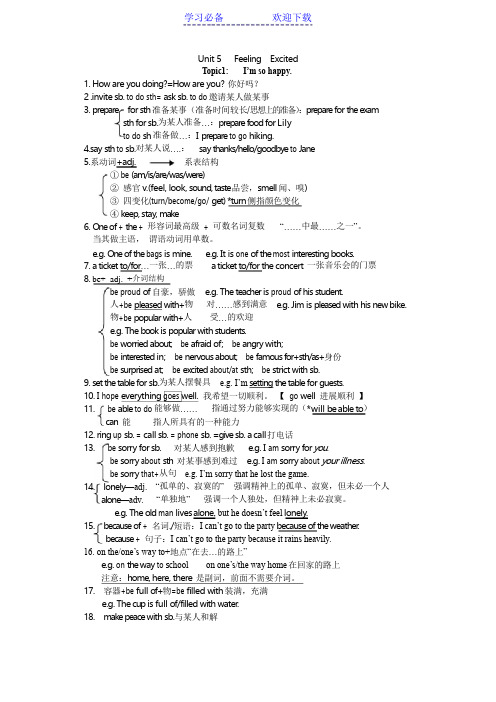
Unit5Feeling ExcitedTopic1:I’m so happy.1.How are you doing?=How are you?你好吗?2.invite sb.to do sth=ask sb.to do邀请某人做某事3.prep are for sth准备某事(准备时间较长/思想上的准备):pr epare for the examsth for sb.为某人准备…:prepare food for Lilyto do sh准备做…:I prepare to go hiking.4.say sth to sb.对某人说….:say thanks/hello/goodbye to Jane5.系动词+adj.系表结构①be(am/is/are/was/were)②感官v.(feel,look,sound,taste品尝,smell闻、嗅)③四变化(turn/become/go/get)*turn侧指颜色变化④keep,stay,mak e6.O ne of+the+形容词最高级+可数名词复数“……中最……之一”。
当其做主语,谓语动词用单数。
e.g.On e of the bags is mine. e.g.It is one of the most interesting books.7.a ticket to/for…一张…的票a ticket to/for the concert一张音乐会的门票8.be+adj.+介词结构be proud of自豪,骄傲 e.g.The teacher is proud of his student.人+be pleased with+物对……感到满意 e.g.Jim is pleased with his new bike.物+be popular with+人受…的欢迎e.g.The b ook is popular with students.be worried about;be afraid of;be angry with;be interested in;be nervous about;be famous for+sth/as+身份be surprised at;be excited about/at sth;be strict with sb.9.set the table for sb.为某人摆餐具 e.g.I’m setting the table for guests.10.I hope everything goes well.我希望一切顺利。
归纳仁爱版八年级下英语语法归纳
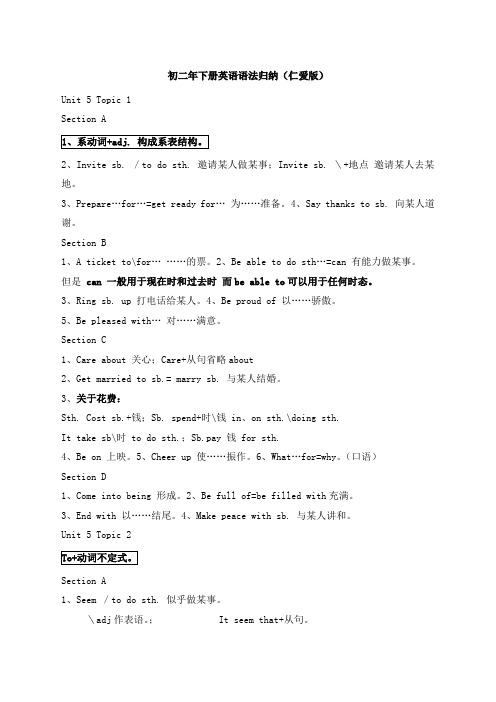
初二年下册英语语法归纳(仁爱版)Unit 5 Topic 1Section A2、Invite sb. /to do sth. 邀请某人做某事;Invite sb. \+地点邀请某人去某地。
3、Prepare…for…=get ready for…为……准备。
4、Say thanks to sb. 向某人道谢。
Section B1、A ticket to\for… ……的票。
2、Be able to do sth…=can 有能力做某事。
但是can 一般用于现在时和过去时而be able to可以用于任何时态。
3、Ring sb. up 打电话给某人。
4、Be proud of 以……骄傲。
5、Be pleased with… 对……满意。
Section C1、Care about 关心;Care+从句省略about2、Get married to sb.= marry sb. 与某人结婚。
3、关于花费:Sth. Cost sb.+钱;Sb. spend+时\钱 in、on sth.\doing sth.It take sb\时 to do sth.;Sb.pay 钱 for sth.4、Be on 上映。
5、Cheer up 使……振作。
6、What…for=why。
(口语)Section D1、Come into being 形成。
2、Be full of=be filled with充满。
3、End with 以……结尾。
4、Make peace with sb. 与某人讲和。
Unit 5 Topic 2Section A1、Seem /to do sth. 似乎做某事。
\adj作表语。
; It seem that+从句。
2、Have talk with sb.与某人交谈。
3、Be strict with sb. 对某人严格。
Section B1、Fail to do sth. 失败,做不到某事。
仁爱版八年级英语下册知识点
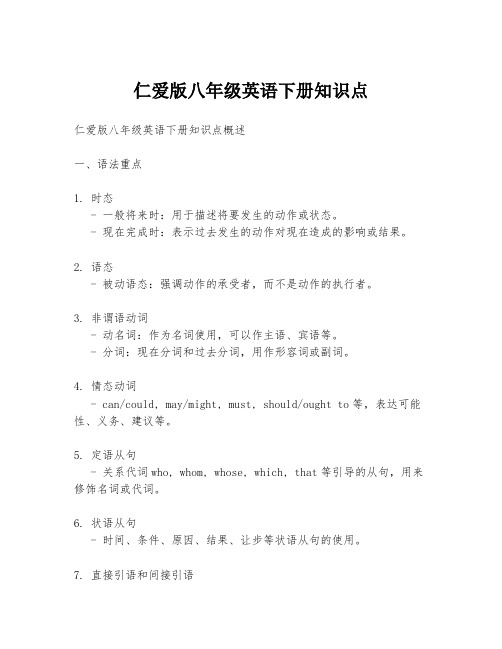
仁爱版八年级英语下册知识点仁爱版八年级英语下册知识点概述一、语法重点1. 时态- 一般将来时:用于描述将要发生的动作或状态。
- 现在完成时:表示过去发生的动作对现在造成的影响或结果。
2. 语态- 被动语态:强调动作的承受者,而不是动作的执行者。
3. 非谓语动词- 动名词:作为名词使用,可以作主语、宾语等。
- 分词:现在分词和过去分词,用作形容词或副词。
4. 情态动词- can/could, may/might, must, should/ought to等,表达可能性、义务、建议等。
5. 定语从句- 关系代词who, whom, whose, which, that等引导的从句,用来修饰名词或代词。
6. 状语从句- 时间、条件、原因、结果、让步等状语从句的使用。
7. 直接引语和间接引语- 引述别人的话,注意时态、人称和指示代词的变化。
二、词汇与短语1. 常用词汇- 描述人物特征的形容词,如kind, honest, creative等。
- 描述日常活动的动词短语,如clean up, take out, give up等。
- 与学校生活相关的名词,如classroom, library, project等。
2. 短语动词- look after, turn off, get along with等。
3. 常见搭配- 形容词与名词的搭配,如good habits, heavy rain等。
- 动词与副词的搭配,如finish quickly, study hard等。
三、阅读理解1. 抓住文章主旨- 通过阅读标题、首段和结尾段,快速把握文章大意。
2. 推理判断- 根据上下文线索,推断生词或隐含信息的含义。
3. 细节理解- 通过关键词定位,准确获取文章中的具体信息。
四、写作技巧1. 句型多样性- 使用复合句、并列句等多样化的句型,丰富文章结构。
2. 逻辑连贯- 使用连接词,如however, therefore, moreover等,使文章结构清晰、逻辑性强。
八年级下册仁爱版英语知识点总结
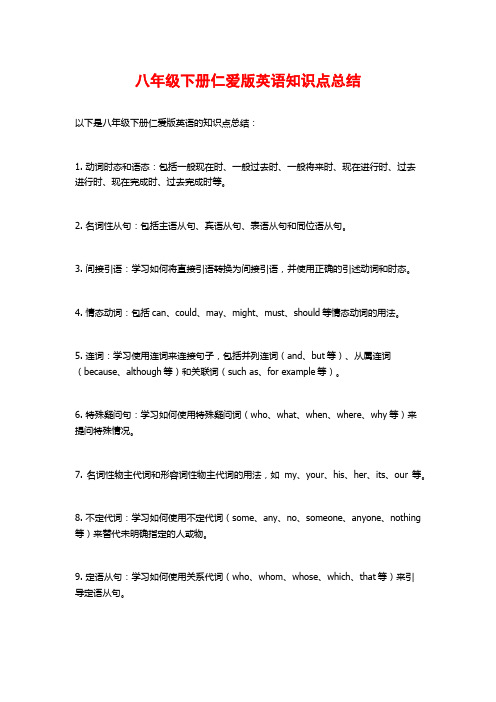
八年级下册仁爱版英语知识点总结
以下是八年级下册仁爱版英语的知识点总结:
1. 动词时态和语态:包括一般现在时、一般过去时、一般将来时、现在进行时、过去
进行时、现在完成时、过去完成时等。
2. 名词性从句:包括主语从句、宾语从句、表语从句和同位语从句。
3. 间接引语:学习如何将直接引语转换为间接引语,并使用正确的引述动词和时态。
4. 情态动词:包括can、could、may、might、must、should等情态动词的用法。
5. 连词:学习使用连词来连接句子,包括并列连词(and、but等)、从属连词(because、although等)和关联词(such as、for example等)。
6. 特殊疑问句:学习如何使用特殊疑问词(who、what、when、where、why等)来
提问特殊情况。
7. 名词性物主代词和形容词性物主代词的用法,如my、your、his、her、its、our等。
8. 不定代词:学习如何使用不定代词(some、any、no、someone、anyone、nothing 等)来替代未明确指定的人或物。
9. 定语从句:学习如何使用关系代词(who、whom、whose、which、that等)来引
导定语从句。
10. 过去分词和现在分词的用法:学习如何使用过去分词和现在分词作为修饰词或动词的补语。
11. 被动语态:学习如何使用被动语态来描述动作的接受者而非执行者。
12. 表达条件和假设的句型:学习如何使用if和unless来表达条件,以及表示假设的句型。
这些知识点涵盖了八年级下册仁爱版英语的基础内容,你可以根据需要逐一进行学习和复习。
仁爱八年级下英语知识点

仁爱八年级下英语知识点英语作为国际通用语言,对于现代人的职业发展和日常交流都极其重要。
在仁爱八年级下,我们将从听说读写四个方面,全面学习英语知识点。
语法知识1. 直述句(陈述句)主语+谓语+宾语例句:She loves ice cream.2. 疑问句(一般疑问句)助动词+主语+谓语+宾语例句:Do you like pizza?3. 祈使句(命令句)动词原形+宾语例句:Clean your room.4. 句子成分(主语、谓语、宾语、定语、状语等)例句:The boy with glasses is my friend.口语表达1. 自我介绍例句:Hello, my name is Jack. I am from Shanghai.2. 意见交流例句:What do you think of this movie?3. 问路例句:Excuse me, where is the nearest bank?4. 约会例句:Would you like to have dinner with me tonight?听力训练1. 美国口音和英国口音的区别2. 不同场景下的英语口语表达3. 对话中正确听取数字、时间等4. 听取简单的新闻或者广播等阅读理解1. 阅读基础知识(字母、数字、大小写)2. 阅读简单的短文,了解文章基本内容3. 阅读故事和小说,理解情节和人物关系4. 阅读新闻等实用文章,了解时事信息写作能力1. 自我介绍2. 写日记、周记、月记等3. 写作文,例如:写一篇关于影响健康的因素的文章4. 写简历,求职信等总结仁爱八年级下英语知识点包含了很多方面,包括语法、口语、听力、阅读和写作等,我们需要在日常学习中逐步积累和运用这些知识点。
只有通过反复的练习和实践,我们才能真正掌握英语知识,使其成为我们通往更广阔世界的一把钥匙。
仁爱版八年级英语下册语法知识点归纳精华版
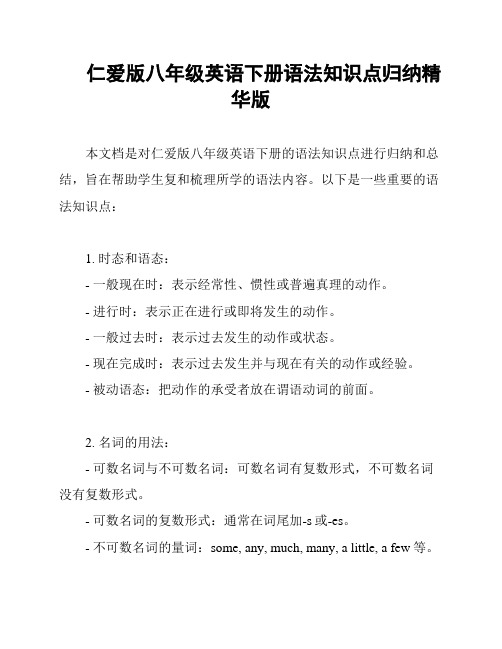
仁爱版八年级英语下册语法知识点归纳精华版本文档是对仁爱版八年级英语下册的语法知识点进行归纳和总结,旨在帮助学生复和梳理所学的语法内容。
以下是一些重要的语法知识点:1. 时态和语态:- 一般现在时:表示经常性、惯性或普遍真理的动作。
- 进行时:表示正在进行或即将发生的动作。
- 一般过去时:表示过去发生的动作或状态。
- 现在完成时:表示过去发生并与现在有关的动作或经验。
- 被动语态:把动作的承受者放在谓语动词的前面。
2. 名词的用法:- 可数名词与不可数名词:可数名词有复数形式,不可数名词没有复数形式。
- 可数名词的复数形式:通常在词尾加-s或-es。
- 不可数名词的量词:some, any, much, many, a little, a few等。
3. 代词的用法:- 人称代词:I, you, he, she, it, we, they。
- 物主代词:my, your, his, her, its, our, their。
- 反身代词:myself, yourself, himself, herself, itself, ourselves, themselves。
- 指示代词:this, that, these, those。
4. 形容词和副词:- 形容词用来修饰名词,副词用来修饰动词、形容词或其他副词。
- 形容词比较级和最高级的构成:基本形式 + er/more + than,基本形式 + est/most。
5. 情态动词:- can: 能够,可以- could: 过去常能够,过去常可以- may: 可以,可能- might: 过去可能- must: 必须- should: 应该- ought to: 应该这些只是一些仁爱版八年级英语下册的语法知识点的简要概述,希望对你的复和记忆有所帮助。
如需详细内容,请参考教材或课堂讲义。
(完整版)【知识点归纳】仁爱版八年级英语(下)重点句型和短语归纳
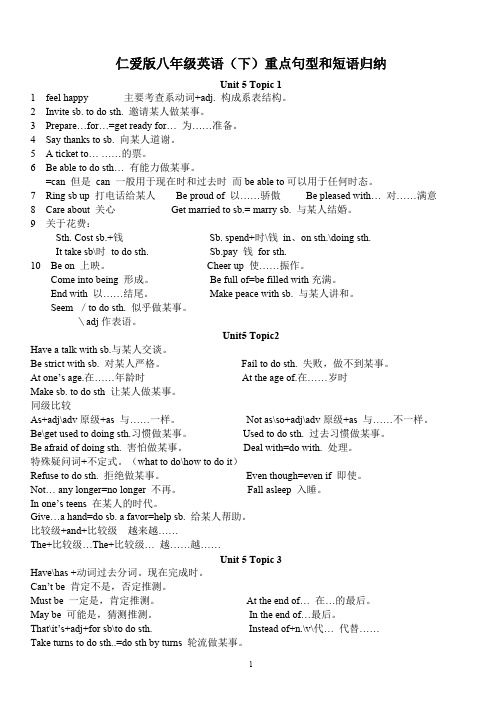
Unit 6 topic1
结果状语从句
Ticket at +钱+for…票的价格。
So…that…引导的结果状语从句。
具体某一天的早、中、晚上,前用介
So+adj.+从句。
词 on。
So+adj+a\an +单数名词+that 从句。
Come up with…想出。
Go on a visit to… 去……旅游、参观。 Look forward to sth\doing sth.盼望某事、
Give…a hand=do sb. a favor=help sb. 给某人帮助。
比较级+and+比较级 越来越……
The+比较级…The+比较级… 越……越……
Unit 5 Topic 3
Have\has +动词过去分词。现在完成时。
Can’t be 肯定不是,否定推测。
Must be 一定是,肯定推测。
It take sb\时 to do sth.
Sb.pay 钱 for sth.
10 Be on 上映。
Cheer up 使……振作。
Come into being 形成。
Be full of=be filled with 充满。
End with 以……结尾。
Make peace with sb. 与某人讲和。
At the foot of… 在……的脚下。
Arrive in + 大地点
Marks the beginning of… 标志着…… Arrive at+ 小地点
的开始。
Have fun doing sth. 从做某事中得到
仁爱版八年级下册英语知识点

仁爱版八年级下册英语知识点仁爱版八年级下册英语知识点概述一、时态与语态1. 一般将来时:用于描述将要发生的动作或状态。
- 构成:will + 动词原形- 例句:We will go on a school trip next week.2. 现在进行时的被动语态:表示正在进行的动作被他人执行。
- 构成:am/is/are + being + 过去分词- 例句:A new road is being built near our school.3. 过去完成时:表示在过去某一时间点之前已经完成的动作。
- 构成:had + 过去分词- 例句:They had finished their homework before the movie started.二、非谓语动词1. 动名词:作为名词使用,表示动作。
- 例句:Swimming is my favorite sport.2. 分词(现在分词与过去分词):- 现在分词:表示正在进行的动作。
- 例句:The children are playing in the park.- 过去分词:表示被动或完成的动作。
- 例句:The window broken by the ball needs to be repaired.三、情态动词1. can/could:表示能力或许可。
- 例句:Can you help me with my homework?- 礼貌请求:Could you please close the door?2. may/might:表示可能性或许可。
- 例句:You may use my computer if you need to.3. must/should:表示建议或义务。
- 例句:You should wear a helmet when riding a bike.- 强调义务:We must obey the traffic rules.四、句型结构1. 条件句:用于表达在特定条件下的结果。
(完整版)仁爱版英语八年级下册知识点梳理

(完整版)仁爱版英语八年级下册知识点梳理Unit 5 Topic 1You look excited【重点词组】1. invite sb. to do sth.邀请某人做某事2.one of +形容词最高级+ 名词复数3. say thanks/hello/sorry/good-bye to sb. 向某人致谢/问好/道歉/告别4. feel/taste/smell/look/sound/seem +adj.5. seem to do sth.seem+adj.it seems that+从句6. a ticket for/to sth.一张……的票7. lonely adj.孤独的alone adj./adv.独自的,一个人的8. because of+n./pron/v-ing 因为,由于9. cheer sb. up使某人振作起来10. care for =take care of = look after照顾11. come into being 形成,产生12. be full of = be filled with充满……13. agree with sb.同意某人14. make peace with sb.与某人和平相处15. in the end =at last = finally最后,最终16. be popular with sb.受某人欢迎【词形变化】1.invite v.邀请invitation n.邀请2.disappionted adj.失望的,沮丧的disappointment n.失望,沮丧disappoint v.使失望3.excite v.使激动,使兴奋excited adj.兴奋的,激动的(修饰人)exciting adj.令人兴奋的,使人激动的(修饰物)4.main adj.主要的mainly adv.主要地5.face n.脸,面部facial adj.面部的6.worry v.担心worried adj.担心的,担忧的【重点句型】1.--How are you doing?你好吗?--Very well.非常好。
仁爱版八年级下英语知识点

仁爱版八年级下英语知识点英语作为全球通用的语言之一,在日常生活和教育中都扮演着重要的角色。
仁爱版八年级下英语教材涵盖了广泛的知识点,包括语法、词汇、听力、口语等方面。
在这篇文章中,我们将介绍仁爱版八年级下英语教材中最重要的知识点。
一、语法知识点1. 过去进行时过去进行时表示过去某一时刻正在进行的动作,结构为“was/were+现在分词”,例如“Yesterday, I was watching TV when my friend came.”2. 现在完成进行时现在完成进行时表示自过去某一时间开始一直持续的动作,结构为“have/has been+现在分词”,例如“I have been studying English for two hours.”3. 情态动词情态动词用来表示说话人对某一行为、状态的态度或可能性、必要性等,包括can/could、shall/should、will/would、may/might、must等。
二、词汇知识点1. 重要的词汇题型仁爱版八年级下英语教材中包含了大量的词汇练习,有些词汇可以帮助你更好地理解文章,有些则是日常交流必备。
在考场上,这些词汇题型占据了很大的比重,因此需要花时间练习和记忆。
2. 同义词在文章和听力中出现许多同义词,这些同义词对于理解文章的主旨和细节十分重要。
例如happy和glad、big和large、go和travel。
三、听力知识点1. 短对话短对话题型是英语考试中的重要题型,也是减分最多的题型,需要在短时间内辨别对话内容,准确选择正确答案。
2. 长篇听力长篇听力题型常常占据考试时间的较大比重,难度也相对较高。
它要求学生在短时间内理解长篇语言,找出问题和解决问题的方法。
四、口语知识点1. 问答题问答题是英语口语考试中最基础的一种形式,要求考生准确回答教师的问题,包括基本的日常口语和学习中的基础知识。
2. 演讲演讲是英语口语考试中最重要的一种形式,要求考生能够准确表达自己的想法,清晰流畅地讲述重要的知识点。
[原创归纳]仁爱版八年级下英语语法归纳
![[原创归纳]仁爱版八年级下英语语法归纳](https://img.taocdn.com/s3/m/8d95b6f58ad63186bceb19e8b8f67c1cfad6eed0.png)
初二年下册英语语法归纳(仁爱版)【2】Unit5Topic1SectionA2.1nvitesb./todosth.邀请或人做某事;Invitesb.\+地点邀请或人去某地.3.Prepare...for...=getreadyfor...为预备.4.Saythankstosb.向或人道谢. SectionBl.Aticketto\for的票.2.Beabletodosth...=can有才能做某事.但是can一般用于如今时和曩昔时而beableto可以用于任何时态・3................................................................................ Ringsb.up打德律风给或人.4.Beproudof以自满.5.Bepleasedwith.对..满足.SectionC1.Careabout关怀;Care+从句省略about2.Getmarriedtosb.=marrysb.与或人娶亲.3.关于消费:Sth.Costsb.+钱;Sb.spend+时\钱in.onsth.'doingsth.Ittakesb\时todosth.;Sb.pay钱forsth.4.Beon上映.5.Cheerup使振作.6.What...for=why.(白话)SectionDeintobeing形成.2.Befullof=befilledwith充满.3.......................... Endwith以结尾.4.Makepeacewithsb.与或人媾和.Unit5Topic2SectionA1.Seem/todosth.似乎做某事.\adj作表语.;Itseemthat+从句.2.Havetalkwithsb.与或人攀谈.3.Bestrictwithsb.对或人严厉.SectionBl.Failtodosth.掉败,做不到某事.2.Atone'sage.在年纪时3.Attheageof.在岁时4.Makesb.todosth让或人做某事.As+adj\adv原级+as与一样;Notas\so+adj\adv原级+as与不一样.6.Be\getusedtodoingsth.习惯做某事;Usedtodosth.曩昔习惯做某事.SectionC 1.Beafraidofdoingsth.畏惧做某事.2.Dealwith=dowith.处理.4.Refusetodosth.谢绝做某事.5.Eventhough=even讦即使.6.Not...anylonger=nolonger不再.7.Fallasleep入睡.8.Inone'steens在或人的时期.9.Give.ahand=dosb.afavor=helpsb.给或人关心.10.比较级+and+比较级越来越程度递增.The+比较级...The+比较级…越越两种情形同时变.11.原因状语从句.Unit5Topic3SectionA1.Have\has+动词曩昔分词.如今完成时.2.Can'tbe确定不是,否认推想.3.Mustbe必定是,确定推想.4.Maybe可能是,猜测推想.5.Attheendof...在…的最后;Intheendof...最后.6・That\it's+adj+foi\tobdosth.7.1nsteadof+n.\v\代…代替8.Taketurnstodosth.=taketurnsatdoingsth.=dobyturns轮流做某事.SectionB 1......................................... B ebad\good for...对有害\益.2661alongwithsb\sth与相处得好.3.Justas似乎.4.Smileat\tosb.\sth.微笑面临或人.某事;Smile,微笑(没有声音);Laugh,大笑(有声音),Laughatsb.取笑或人.5.Giveasurprisetosb=givesbasurprise给或人一个惊喜.6.0ntheone'swayto...在或人去的路上;后接副词则省去to.SectionC1.世界上举世无双的事物前加定冠词the2.Hadbetterdosth\notdosth.最好做某事.不要做某事.SectionD1.Getbacktosth持续回到某事上.Unit6topic1l.Goonavisitto...去旅游.参不雅.2.1t'shatetosay这很难说.3.Decidetodosth决议做某事.4.Make(take)adecide下决议.5.Decideon\upon决议.SectionBl.Ticketat+钱+for...票的价钱.2・具体某一天的早・中・晚上,前用介词on・SectionCeupwith…想出.2.Lookforwardtosth\doingsth.愿望某事.愿望做某事.3.Hearfromsb收到或人来信.SectionD动词不定式1•根本情势:to+动词本相(确定情势)Notto+动词本相(否认情势)2・特点:没有人称和数的变化・3・常用句型:It's+adj+todosth.Too+adj+todosth・4・动词不定式可以跟疑问词连用・E.g:Idon'tknowwhattodo\howtodoit.Unit6topic2SectionA1.Plantodosth.筹划做某事.2.Makeaplanto...\makeplansto...制订的筹戈U.SectionB1.Atthefoot of...在的脚下.2.Marksthebeginningof标志着的开端.3.Bytheway.趁便问一下.4.Onbothsides of...在的两旁.5.“几个半”表示办法:基数词+and+ahalf+n.=基数词+n.+and+ahalf.E.g.oneandahalfyears=oneyearandahalf.一年半.6.表示方位的介词差别Inthe+方位名词+of・・・指某一规模内的地区.(中国,北京)tothe+方位名词+of・・・指互不交界互不管辖的地区.(中国,日本)onthe+方位名词+of・互相交界但互不管辖的地区.(中国,尼泊尔)SectionCl.Outofsight看不见(视线之外)2.Noticesbdo\doingsth.留意或人(正在做)做某事.3.Can'thelpdoing不由得.4.Arrivein+大地点;Arriveon+小地点SectionD1.Havefundoingsth.从做某事中得到乐趣.2.时光状语从句特点:常用一般如今时表示未来时;主句未来时,从句用一般如今时;时态一致——主句与从句同时为曩昔时.引诱时光状语从属连词:When(当的时刻,强调统一时光或一前一后)while(当的时刻,带有延续性)before(在之前)after(在之后)as(当的时刻)until.till(直至U为止)assoonas (一就)Unit6topic3SectionAl.Beafraidofdoingsth.\that+从句.畏惧做某事.SectionB1.Warnsbtodosth\nottodosth.警告.提示或人做某事.不做某事.2.Warnsbaboutsth提示或人某事.SectionC1.Goondoingsth持续做某事(统一件);Goontodosth.持续做某事(另一件)2.Make\letsbdosth使或人做某事.3.使役动词makelethave等,一律省去to,直接加动词本相.SectionD前提状语从句:1•由if,uness(除非)引诱的状语从句叫前提状语从句.2.特点:常用一般如今时表示未来时;主句未来时,从句用一般如今时.主句含一般未来时.祈使句•情态动词,从句用一般如今时.Unit7topic1SectionA1.Turnto=asksb.forhelp向或人乞助.2.Knowabout懂得.3.Chatwithsb.ontheinternet和或人在网上谈天.4.Tryone'sbest\doone'sbest尽或人最大尽力.5./Thinkover细心斟酌\Thinkof斟酌,对有意见.此时可与thinkabout交换.6.Imaginedoingsth.想象做某事.SectionB1.Haveasweettooth爱吃甜食.2.What'smore并且.SectionCl.Inorderto do...为了做;Inorderthat+从句引诱目标状语从句.2.Keepupsth.保持做……3.Seed+间接宾语(sb.)+直接宾语(sth.)双宾构造句.4.Givesb.bes twishesto.或人最好的祝贺给...What引诱的感慨句,强调名词,单数可数名词前带冠词a\an・有时主语和谓语可以省去.SectionDetrue系表构造.成为实际.2.Invitation邀请函.3•宾语从句IUnit7topic2SectionA1.Beglad+adj.+that从句.愉快……2.Cutsth.切某物;Cutup切碎;Cutsth.Into...切成;Cutdown砍到.3.Addto添加;Add...to…将加在…;Addup加起来;Addupto总计为4.表次序词:(含序数词)First起首.Second其次next在此then然后.Afterthat然后finally最后. SectionBl.Spreadsthonsth.往上面抹2.Practicemakesperfect熟能生巧. SectionCl.Startwith以……开端.2.Eatsth.up吃完,吃光.3.Finishdoingsth.完成做某事.4.Pickup捡起,捡起.SectionD1.Atthesametime同时.2•宾语从句IIf\whether引诱的宾语从句,不能省略引诱词可以与whether通用,但在whether ・・・or not的情形下则不能.Unit7topic3SectionAl.Forsale待售;0nsale出售.2.Besatisfiedwith...对满足.3.Wishsb.sth.祝贺或人;Wishtodosth=Hopetodosth.愿望做某事.Wishsb.todosth.愿望或人做某事.4.Hope斟酌可能性的“愿望”;Wish不斟酌是否可能.SectionBl.Ordersbtodosth敕令或人做或人;Orderthat+从句.SectionCl.Beworthdoingsth.值得做某事.SectionD1.1t'ssaid...据说后接that引诱从句.2.1nshort总之.3.Notonly.butalso.不但..并且..衔接的并列成分必须雷同,当衔接两个名词或代词为主语.谓语动词单复数采用就近原则,保持一致.4.Notall并非,部分否认.5.It'sbelievedthat...信任6•副词比较级根本用法:副词的比较等级情势与变化与形容词大致雷同,今后缀-ly结尾的比较级和最高等大多在前面加more和most(1)原级・As+adj./adv.原级+as和一样.⑵比较级.Adj./adv.比较级+than比…更…⑶最高等•三者或三者以上比较时,常用the+adj./adv.最高等+in/of・・・(比较规模).副词最高等前可以省略the否认比较级可用less+adj./adv.原级+than.同级比较中第一个as前面用序数词或量词润饰,可表示倍数关系.形容词和副词比较级前用much\alot等润饰,表示不同程度.借助other.else或否认词,比较级情势可用来表示最高等概念.(4)the+比较级,the+比较级表示越越⑸比较级+and+比较级.表示越来越……Unit8Topic1SectionA1.目标状语从句.(同成果状语从句)So・・・that・・・引诱的状语从句.So+adj./adv.+that・...so+adj.+an/a+名词单数+that・・・如斯以至于用于引诱主句导致的成果.Such+n.+that•从句•同样表示如斯以至于.不同:so后面接形容词或副词,such后面接名词.SectionBl.Bemakeof+原料由制成.(看得出原材料)2.Bemakefrom+原料由制成.(看不出原材料)3.Afford(tobuy)sth.买得起.累赘得起SectionCl.Dependon依附.取决于.2.Dependonsb.todosth.dependonsb./sth.3.Thesame as...与一样.4.Nearly差不多.Near邻近.5.Hard尽力地.Hardly几乎不.SectionD1.Protect....from...破坏…不受…的损害.2.Youarewhatyouwear衣如其人. Unit8Topic2SectionA1.Allowsb.todosth.许可或人做某事;Allowdoingsth许可做某事.2.Suitableforsb.todosth.对或人来说合适做某事.3.Stopsb.fromdoingsth.阻拦或人做某事.4.Tocarryouttheplan把筹划付诸行动.5.Atwork在工作,从事于SectionBSectionC...SectionD1.Advise建议.作动词;Advice建议.作名词.2.Artofdressing着装艺术. Unit8Topic3SectionA1.Thereisgoingtobe=therewillbe(初一常识)未来时构造.SectionB1.Askforsb./sth至于,就或人.某事而言.2.Another作形容词,意为又一个,再一个.其构造为:/another+n.单数可数=onemore+n.单数可数.\another+数词+n.复数可数=数词+more+n.复数可数.SectionCl.Getitsname得名.2.Design…as…把设计成3.Either...or...要么要么,不是就是,表选择关系.4.区分that,those,one,ones.That指代上文消失过的不可数名词.Those指代上文消失过的复数名词.One指代上文消失过的可数名词的单数.Ones指代上文消失过的可数名词的复数.SectionDl.Well-known=widelyknown众所周知.2.Atthetime一度,曾经.3.Atatime每一次.用在句末.4.Attimes有时刻.等于sometimes5.Except除了以外.除去部分不包括在内;Besides除了以外,还有除去部分包括在内;But除了......以外,没有......,只有......6•宾语从句皿删除:假如句中含有助动词do\does\did就把其删掉落后面的动词,作出响应的变化.移动:假如句子含有情态动词和be动词,以及否认的助动词,把它们移动到主语后,行动动词前.宾语从句的口诀:进修宾从要留意,时态语序和连词.时态主从要呼应:主句若为如今时,从句时态随句意.主句若为曩昔时,从句时态变曩昔.宾从所示表真谛,时态不变不疑惑.语序要用陈述序,切莫照搬疑问句.That衔接陈述句,省与不省要留意•从句若表“是否”时fwhether要切记.特别问句做宾语,仍用本来疑问词.三个问题要记牢,切莫丢东又往西.。
八年级下册英语仁爱版知识点总结
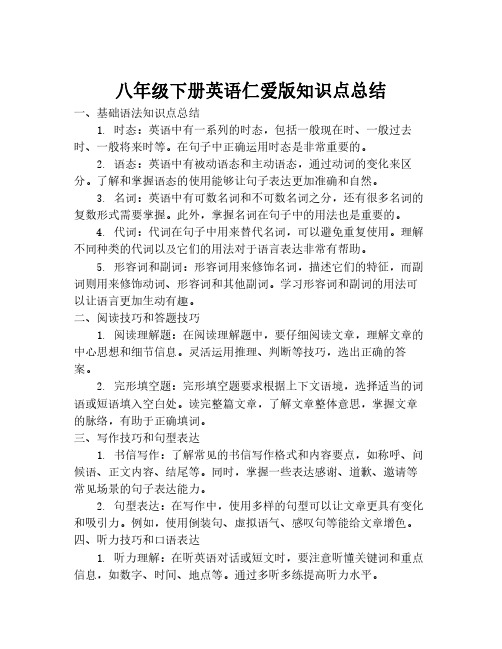
八年级下册英语仁爱版知识点总结一、基础语法知识点总结1.时态:英语中有一系列的时态,包括一般现在时、一般过去时、一般将来时等。
在句子中正确运用时态是非常重要的。
2.语态:英语中有被动语态和主动语态,通过动词的变化来区分。
了解和掌握语态的使用能够让句子表达更加准确和自然。
3.名词:英语中有可数名词和不可数名词之分,还有很多名词的复数形式需要掌握。
此外,掌握名词在句子中的用法也是重要的。
4.代词:代词在句子中用来替代名词,可以避免重复使用。
理解不同种类的代词以及它们的用法对于语言表达非常有帮助。
5.形容词和副词:形容词用来修饰名词,描述它们的特征,而副词则用来修饰动词、形容词和其他副词。
学习形容词和副词的用法可以让语言更加生动有趣。
二、阅读技巧和答题技巧1.阅读理解题:在阅读理解题中,要仔细阅读文章,理解文章的中心思想和细节信息。
灵活运用推理、判断等技巧,选出正确的答案。
2.完形填空题:完形填空题要求根据上下文语境,选择适当的词语或短语填入空白处。
读完整篇文章,了解文章整体意思,掌握文章的脉络,有助于正确填词。
三、写作技巧和句型表达1.书信写作:了解常见的书信写作格式和内容要点,如称呼、问候语、正文内容、结尾等。
同时,掌握一些表达感谢、道歉、邀请等常见场景的句子表达能力。
2.句型表达:在写作中,使用多样的句型可以让文章更具有变化和吸引力。
例如,使用倒装句、虚拟语气、感叹句等能给文章增色。
四、听力技巧和口语表达1.听力理解:在听英语对话或短文时,要注意听懂关键词和重点信息,如数字、时间、地点等。
通过多听多练提高听力水平。
2.口语表达:在平时的学习中,要勇敢开口、模仿和积极参与口语练习。
尽量多与他人交流,提高口语表达能力。
以上是八年级下册英语仁爱版的知识点总结,希望能对同学们的学习有所帮助。
学好英语需要不断的练习和积累,相信只要坚持下去,一定会取得进步的。
加油!。
八年级英语下册 语法归纳大全 仁爱版

初中英语语法大全初中英语语法学习提纲看到p50谓语时态一、词类、句子成分和构词法:1、词类:英语词类分十种:名词、形容词、代词、数词、冠词、动词、副词、介词、连词、感叹词。
1、名词(n.):表示人、事物、地点或抽象概念的名称。
如:boy, morning, bag, ball, class, orange.2、代词(pron.):主要用来代替名词。
如:who, she, you, it .3、形容词(adj..):表示人或事物的性质或特征。
如:good, right, white, orange .4、数词(num.):表示数目或事物的顺序。
如:one, two, three, first, second, third, fourth.5、动词(v.):表示动作或状态。
如:am, is,are,have,see .6、副词(adv.):修饰动词、形容词或其他副词,说明时间、地点、程度等。
如:now, very, here, often, quietly, slowly.7、冠词(art..):用在名词前,帮助说明名词。
如:a, an, the.8、介词(prep.):表示它后面的名词或代词与其他句子成分的关系。
如in, on, from, above, behind.9、连词(conj.):用来连接词、短语或句子。
如and, but, before .10、感叹词(interj..)表示喜、怒、哀、乐等感情。
如:oh, well, hi, hello.2、句子成分:英语句子成分分为七种:主语、谓语、宾语、定语、状语、表语、宾语补足语。
1、主语是句子所要说的人或事物,回答是“谁”或者“什么”。
通常用名词或代词担任。
如:I’m Miss Green.(我是格林小姐)2、谓语动词说明主语的动作或状态,回答“做(什么)”。
主要由动词担任。
如:Jack cleans the room every day. (杰克每天打扫房间)3、表语在系动词之后,说明主语的身份或特征,回答是“什么”或者“怎么样”。
(完整版)仁爱版八年级英语下册语言知识点归纳
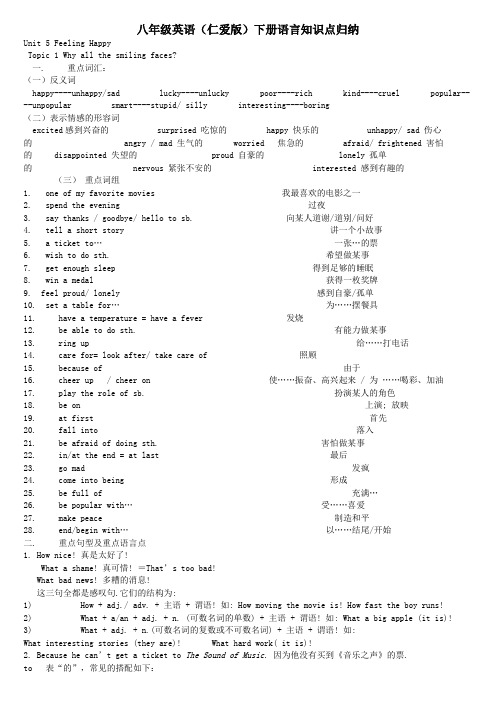
八年级英语(仁爱版)下册语言知识点归纳Unit 5 Feeling HappyTopic 1 Why all the smiling faces?一. 重点词汇:(一)反义词happy----unhappy/sad lucky----unlucky poor----rich kind----cruel popular----unpopular smart----stupid/ silly interesting----boring(二)表示情感的形容词excited感到兴奋的 surprised 吃惊的 happy 快乐的 unhappy/ sad 伤心的 angry / mad 生气的 worried 焦急的 afraid/ frightened 害怕的 disappointed 失望的 proud 自豪的 lonely 孤单的 nervous 紧张不安的 interested 感到有趣的(三)重点词组1. one of my favorite movies 我最喜欢的电影之一2. spend the evening 过夜3. say thanks / goodbye/ hello to sb. 向某人道谢/道别/问好4. tell a short story 讲一个小故事5. a ticket to…一张…的票6. wish to do sth. 希望做某事7. get enough sleep 得到足够的睡眠8. win a medal 获得一枚奖牌9. feel proud/ lonely 感到自豪/孤单10. set a table for…为……摆餐具11. have a temperature = have a fever 发烧12. be able to do sth. 有能力做某事13. ring up 给……打电话14. care for= look after/ take care of 照顾15. because of 由于16. cheer up / cheer on 使……振奋、高兴起来 / 为……喝彩、加油17. play the role of sb. 扮演某人的角色18. be on 上演; 放映19. at first 首先20. fall into 落入21. be afraid of doing sth. 害怕做某事22. in/at the end = at last 最后23. go mad 发疯24. come into being 形成25. be full of 充满…26. be popular with…受……喜爱27. make peace 制造和平28. end/begin with…以……结尾/开始二. 重点句型及重点语言点1. How nice! 真是太好了!What a shame! 真可惜! =That’s too bad!What bad news! 多糟的消息!这三句全都是感叹句.它们的结构为:1) How + adj./ adv. + 主语 + 谓语! 如: How moving the movie is! How fast the boy runs!2) What + a/an + adj. + n. (可数名词的单数) + 主语 + 谓语! 如: What a big apple (it is)!3) What + adj. + n.(可数名词的复数或不可数名词) + 主语 + 谓语! 如:What interesting stories (they are)! What hard work( it is)!2. Because he can’t get a ticket to The Sound of Music. 因为他没有买到《音乐之声》的票.to 表“的”,常见的搭配如下:a ticket to The Sound of Music 一张《音乐之声》的票the answer to the question 问题的答案the key to the door 门的钥匙the way to…去…..的路3. I think Mr. Lee likes it very much and really wishes to watch it. 我认为李老师非常喜欢它而且的确想去看. wish/ hope to do sth.希望做某事与 wish 相关的结构还有: wish/ hope + that引导的从句; 如:I wish/ hope (that) we will win.我们可以说wish sb. to do sth. 而不能说hope sb. to do sth.;4. I’ll ring up Michael later. 稍后我打电话给迈克.ring up sb. = call/ ring/ phone sb. = give sb. a ring/ call/ telephone = make a telephone to sb.当宾语为代词时, 只能放中间.如: ring me/him/her up5.…since they were not able to go. ……既然他们不能去.can与be able to 二者都表“能;会”,在指“一般能力”时,常互换。
仁爱英语八年级下册知识点梳理
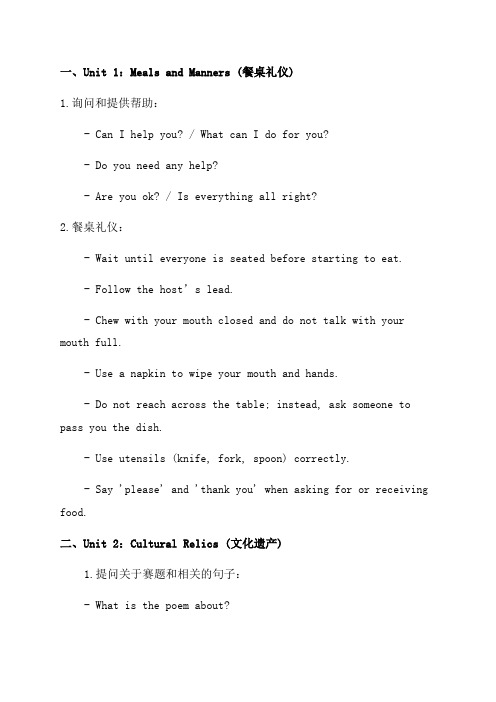
一、Unit 1:Meals and Manners (餐桌礼仪)1.询问和提供帮助:- Can I help you? / What can I do for you?- Do you need any help?- Are you ok? / Is everything all right?2.餐桌礼仪:- Wait until everyone is seated before starting to eat.- Follow the host’s lead.- Chew with your mouth closed and do not talk with your mouth full.- Use a napkin to wipe your mouth and hands.- Do not reach across the table; instead, ask someone to pass you the dish.- Use utensils (knife, fork, spoon) correctly.- Say 'please' and 'thank you' when asking for or receiving food.二、Unit 2:Cultural Relics (文化遗产)1.提问关于赛题和相关的句子:- What is the poem about?- What can you see in the picture?- What can a person learn from the painting?- What is mentioned in the text?- How does the text describe...?- What does the writer mean by...?2.介绍文化遗产:- The Great Wall of China- The Colosseum- The Parthenon- The Taj Mahal- Stonehenge- The Great Pyramid of Giza- The Sydney Opera House三、Unit 3:A taste of English humour (英式幽默之味)1.幽默和笑话:- What do you get if you cross...?- Why did the...?- What do you call...?- Why was the...?2.提出猜测:- I guess / suppose / imagine / suspect / believe- I think / feel / reckon- It seems / It appears / It looks like / It sounds like / It feels like四、Unit 4:Our world (我们的世界)1.描述地理位置:- Where is...?- It is located in...- It is in the... part of...- It is bordered by...- It is east / west / north / south of...2.描述气候和天气:- What is the weather like in...?- It is hot / cold / warm / cool / sunny / rainy / cloudy / windy / snowy.- The temperature is...- There is a chance of... / chance of rain / chance of snow.五、Unit 5:Pets and their lives (宠物与宠物的生活)1.宠物分类:- Dogs- Cats- Birds- Fish- Rabbits- Hamsters- Turtles- Snakes2.宠物的习性和需要:- Dogs need to be walked regularly.- Cats are independent animals.- Birds need a cage and regular feeding.- Fish need a tank with clean water.- Rabbits need a hutch and space to hop around.- Hamsters need a small cage with a wheel.- Turtles need a tank with water and a place to bask in the sun.- Snakes need a tank with a heat lamp and regular feeding.六、Unit 6:Green Earth (绿色地球)1.环境保护:- Reduce, Reuse, Recycle- Don't litter / Don't throw rubbish on the ground - Save water / Don't waste water- Plant trees / Save trees- Use energy-efficient light bulbs- Use public transportation / Carpool / Ride a bike - Don't use plastic bags / Use reusable bags2.环境问题:- Air pollution- Water pollution- Land pollution- Deforestation- Global warming- Climate change七、Unit 7:Serious matters (严肃的事情)1.表达不同意见:- I disagree / don’t agree with...- I think / feel / believe that...- In my opinion / view / point of view / experience...- From my experience / perspective...- It seems to me that...2.辩论技巧:- Present arguments and examples to support your opinion.- Use transition words and phrases to show contrast, cause and effect, and concession.- Listen to and consider counterarguments.- Summarize your main points and restate your opinion in the conclusion.八、Unit 8:Step by step (一步一步)1.描述过程和操作:- First, / Secondly, / Next, / Then, / Finally,- To start / begin with,- In the end / in the final step,- Use action verbs and adverbs to show the steps and sequence.2.指示和警示符号:- Danger / Warning: Signaling hazardous situations- Prohibition / No: Indicating prohibited actions- Mandatory / Must: Requiring specific actions- Information / Caution: Providing necessary information九、Unit 9:Science and technology (科学与技术)1.科技发展:- Invention and discovery- Scientific research and experimentation- Technological advancements- Medicine and health care- Pollution control and environmental protection2.比较和对比:- Similarities: Similarly, In the same way, Equally- Differences: However, On the other hand, Whereas, Unlike十、Unit 10:A famous person (一个著名人物)1.描述性格特点和外貌:- Appearance: tall, short, slim, overweight, curly / straight hair- Personality: kind, friendly, hardworking, talented, confident, determined2.描述成就和贡献:- Contributions to society / the world- Awards and honors received- Impact and influence on others以上是仁爱英语八年级下册的部分重要知识点梳理,希望对你的学习有所帮助。
八下仁爱英语知识点八下仁爱英语教材讲解

八下仁爱英语知识点八下仁爱英语教材讲解《仁爱版英语》是由北京市仁爱教育研究的英语教材。
那么八下英语有哪些知识点呢?接下来小编为你整理了八下仁爱英语知识点,一起来看看吧。
八下仁爱英语知识点(1):语法1. Linking verb + adjective 系动词+形容词,构成系表结构.系动词:be (是)feel look sound taste turn get become smell seem 等等.For example :The food tastes delious.注意:(1). 有些连系动词通常不用于被动语态和进行时态中。
如:feel, taste等词。
例如:-Do you like the material?-Yes, it feels very soft.(2). 一般情况下,连系动词主要跟形容词或分词作表语。
例如:Be careful when you cross this very busy street. If not, you may get run over by a car.(3). 能跟名词作表语的连系动词常见的有:be, become, appear, seem, prove, remain和turn等.注意:turn后跟(表示主语身份的)名词作表语时,不加冠词。
例如:Twenty years later, he turned teacher.The population growth inChinaremains a problem.(4). 连系动词也可跟不定式(to do / to be),常见的有:appear, seem, remain, prove, look等。
例如:Having a trip abroad is certainly good for the old couple, but it remains to be seen whether they will enjoy it.On the long journey, Peter proved to be a most interesting guide. We all had a wonderful time.2. hope 与wish 的比较.都与that引导的从句连用.Hope常用于将来时表可能实现的愿望. Wish常用于过去式表示不可能实现的愿望.For example : I hope that you will be happy.I wish that you could be happy.3. 动词-ing 和-ed形式作主语补语的区别.动词-ing表示主语的特征,常用于事物.动词-ed表示主语的状态,常用于人.这类词有:interest move active disappoint excite surprise frighten bore 等等.For example:The game is interesting.I am interested in the game.4.表示能力的词.Could 表示过去的能力.Can表示现在的能力be able to 表示过去,现在,将来任何时候的能力.将来时态(shall \will be able to----)八下仁爱英语知识点(2):词性转换1. correct adj.正确的correctly adv.2. office n.办公室officer n.警官,军官official n.官员,高级职员adj.官方的,正式的3. daily adj. 日常的adv.日常地n.日报4. great adj.伟大的,极好的greatly adv.非常,很,大大的5. beauty n.美丽,美人,美好的东西beautiful adj.美丽的,漂亮的beautifully adv.漂亮地,美好地6. dress v.穿衣n.连衣裙,女装dressing n.穿戴,穿衣八下仁爱英语知识点(3):短语归纳1.There be 句型一般将来时结构:There will be.../There is going to be...2.in the center of... 在……中央3.a traditional dress 传统服装4.in the world of... 在……领域5.high fashion 高级时装6.another+名词单数=one more +名词单数e.g.another apple= one more apple7.another+数词+名词复数=数词+more+名词复数e.g.another two years=two more years8.minority costume 少数民族服装9.be(not) sure of/about... 对……(没)有把握be sure to do sth. 一定做某事be sure that+从句一定……make sure 弄清楚,确信10.be full of... 充满……11.stand for 代表,象征be the/a symbol of... 是……的象征12.become/be known to... 为……所熟知13.from then on 从那时起14.either...or... 要么……要么……,或者……或者(谓语动词就近原则)15.not only...but (also)... 不但……而且……(谓语动词就近原则)16.both...and...两者都……(谓语动词复数)17.design...as... 把……设计成……18.at one time=once 曾经,一度19.as a result 结果。
仁爱版英语八年级下全册语法精讲

仁爱英语八年级下全册语法精讲连系动词的种类及其基本用法一、连系动词的种类。
连系动词也叫系动词,是表示主语“是什么”或“怎么样”的词。
它本身有词义,但不能单独作谓语,后面必须跟表语,构成系表结构来说明主语的状况、性质、特征等。
主要有:be, become, get,turn,grow, look, feel, seem, sound, taste, smell, appear等。
常见的连系动词可分为五种。
1. 状态系动词:只有be一词。
I am used to going about alone.我习惯于独来独往。
2. 持续系动词:表示主语继续或保持一种状况或态度,主要有keep,remain,stay, rest, lie, stand。
I hope you’ll stay healthy.我希望你身体好。
He always kept silent at meeting.他开会时总保持沉默。
The door remained closed. 门仍然关着。
3.表像系动词:表示“看起来好像”,主要有seem, appear, look等。
He looks tired. 他看起来很累。
He seems (to be) quite happy.他好像很快活。
He appeared quite well.他显得身体相当好。
4. 感官系动词:表示“……起来”,有feel (摸起来,感觉) , smell (闻起来) ,sound (听起来) , taste (尝起来,吃起来) 等。
This kind of cloth feels very soft. 这种布摸起来很软。
They looked very tired. 他们看起来很累。
It sounds a good idea.这听起来是个好主意。
This food tastes good.这食物尝起来不错。
5.变化系动词:表示主语变成什么样,即表示从一种状态变为另一种状态。
- 1、下载文档前请自行甄别文档内容的完整性,平台不提供额外的编辑、内容补充、找答案等附加服务。
- 2、"仅部分预览"的文档,不可在线预览部分如存在完整性等问题,可反馈申请退款(可完整预览的文档不适用该条件!)。
- 3、如文档侵犯您的权益,请联系客服反馈,我们会尽快为您处理(人工客服工作时间:9:00-18:30)。
Unit 5Feeling ExcitedTopic1: I’m so happy.1. How are you doing?=How are you? 你好吗?2 .invite sb. to do sth= ask sb. to do邀请某人做某事3. prepare for sth准备某事(准备时间较长/思想上的准备):prepare for the examsth for sb.为某人准备…:prepare food for Lily准备做…:I prepare to go hiking.4.say sth to sb.对某人说….:say thanks/hello/goodbye to Jane5.系动词+adj.系表结构① be (am/is/are/was/were)②感官v.(feel, look, sound, taste品尝,smell闻、嗅)③四变化(turn/become/go/ get) *turn侧指颜色变化④ keep, stay, make6. One of + the + 形容词最高级+ 可数名词复数“……中最……之一”。
当其做主语,谓语动词用单数。
e.g. One of the bags is mine. e.g. It is one of the most interesting books.7. a ticket to/for…一张…的票 a ticket to/for the concert 一张音乐会的门票8. be+ adj. + 介词结构be proud of自豪,骄傲 e.g. The teacher is proud of his student.人+be pleased with+物对……感到满意 e.g. Jim is pleased with his new bike.物+be popular with+人受…的欢迎e.g. The book is popular with students.be worried about; be afraid of; be angry with;be interested in; be nervous about; be famous for+sth/as+身份be surprised at; be excited about/at sth; be strict with sb.9. set the table for sb.为某人摆餐具 e.g. I’m setting the table for guests.我希望一切顺利。
【go well 进展顺利】11. be able to do能够做…… 指通过努力能够实现的(*will be able to)can 能指人所具有的一种能力12. ring up sb. = call sb. = phone sb. =give sb. a call打电话13. be sorry for sb. 对某人感到抱歉 e.g. I am sorry for you.be sorry about sth 对某事感到难过 e.g. I am sorry about your illness.be sorry that+从句 e.g. I’m sorry that he lost the game.14. lonely—adj. “孤单的、寂寞的” 强调精神上的孤单、寂寞,但未必一个人alone—adv. “单独地” 强调一个人独处,但精神上未必寂寞。
e.g. The old man lives alone, but he doesn’t feel lonely.15. because of + 名词./短语:I can’t go to the party because of the weather.because + 句子:I can’t go to the party because it rains heavily.16. on the/one’s way to+地点“在去…的路上”e.g. on the way to s chool on one’s/the way home在回家的路上注意:home, here, there 是副词,前面不需要介词。
17. 容器+be full of+物=be filled with装满,充满e.g. The cup is full of/filled with water.18. make peace with sb.与某人和解Topic2: I’m feeling better now.1.+从句:It seems/ed that he is/was ill.seem的用法+to do:He seems/ed to be ill.+形容词.:He seems/ed ill.2.do badly/well in=be bad/good at在某方面做得好/不好3.She has no friends to talk with.她没有可以交谈的朋友。
【动词不定式在此处做:后置定语】4.have a talk with sb.=talk to/with sb.与某人交谈5.be worried about sth对……感到担心=worry about sth担心……6.send sth to sb.=send sb. sth把某物寄给某人7.Take it easy.别着急!/别紧张!8. I want to be your friend.我想成为你的朋友。
= I want to make friends with you.我想和你交朋友。
make friends with sb. 和某人交朋友9. fail/pass the exam考试不及格/通过考试10.Everyone gets these feelings at your age. at one’s age在某人的这段年龄时区别:at the age of在…岁时in one’s teens在某人十几岁时11. call sb. at+号码打… 号码找某人 e.g. call Mr. Wang at 228790412.too much+不可数n. 太多的…… m uch too+adj. 实在太……13.get/be used to doing sth习惯于做某事区:used to do过去常常做…e.g. I am/get used to getting up early. 我习惯于早起。
14. as+ adj./adv. 原级+ as ……和……一样e.g. -Helen is as tall as Maria. e.g. -Helen runs as quickly as Lily.not + as/so+ adj./adv. 原级+ as ……不如……e.g. -Helen isn’t as tall as Maria. e.g. -Helen doesn’t sing as/so well as Lucy.注:①无论是肯定结构as…as…还是否定结构not as/so…as..,中间都用adj/adv原级。
②谓语若是be,则用adj.原级;谓语若是v.,则用adv.原级。
15.speak in public在公共场所说话16.fall asleep入睡make faces做鬼脸17.be killed in 在…中丧身 e.g. He was killed in the accident.18.refuse to do拒绝做某事even though=even if尽管,即使no longer=not…any longer(多用于延续性v.)19.不再You won’t live in Fuzhou any longer.=You will no longer live in Fuzhouno more=not…any more(多用于短暂性v.)e.g. You won’t see him any more.=You will see him no more.Topic3:Many things can affect our feelings.1.must be----肯定推测;can’t be---否定推测may be---可能性较小的推测e.g. The boy must be Jim. This book can’t be Jim’s.2.hate to do =hate doing讨厌做某事3.follow one’s advice遵从某人的建议get well=become well 康复4. I hope so.-----I hope not. I’m afraid so.----I’m afr aid not.I believe so.----I believe not. I think so.-----I don’t think so.5. take turns to do轮流做某事:We take turns to sing songs.in turn轮流:We sing songs in turn.It’s one’s turn to do轮到某人做某事:It’s my turn to clean a room.6.study/learn (sth) by oneself=teach oneself (sth) 自学(某事)7.That’s very nice of you.你真好!(of表人的性格、品质)8. It’s +adj.+ for sb. + to do sth. It’s important for me to study well.It’s +adj. + of sb.+ to do sth It’s nice of you to help me.注:若adj.用来修饰人的性格、品质,则用of,若adj.用来修饰to do,则用for。
9.help sb. with sth.=help sb.(to) do sth帮助某人做某事e.g. I help Jim with English.=I help Jim to study English.10.affect one’s feelings影响某人的心情11. 心情好:be in a good mood/be in good spirits/feel one’s best心情不好:be in a bad mood/be in low spirits 情绪高涨:be in high spirits12.give a surprise to sb. 给某人一个惊喜in surprise惊奇地to one’s surprise令某人惊喜的是13.at the English corner在英语角14.let sb. (not) do让某人(别)做某事make sb. (not) do15.get along/on (well) with sb.与某人相处(融洽)16.give a speech演讲.get together with sb.与某人团聚17.too+形容词/副词+ to… = so +形容词/副词+句子“太……而无法……”e.g. It’s too noisy for me to fall asleep.=It’s so noisy that I can’t fall asleep.18. be important to sb.对某人来说是重要的be important for sb. to do sth对某人来说做某事是重要的19. remember to do记得去做某事(事情还没做)remember doing记得曾做过某事(事情已做了)20. make a decision (to do)=decide (to do)决定做某事Unit6 Enjoy CyclingTopic1 I have some exciting news to tell you.一、重点词组1.go on a visit to 去……旅行2. make the decision 做决定3.bring back 带回4.go on a field trip 去野外旅行5.decide on (upon) sth 对某事做出决定6 see the sunrise 看日出7. make a reservation 预订8. come up with 想出(主意)9. look forward to (doing) sth 期望10. pay for 支付;赔偿11. raise money 筹钱12. book a ticket 订票13. make a room for sb 为……订房间14. have a wonderful time 玩得愉快15. in the daytime 在白天16. a two-day visit 为期两天的旅行17.find out 查出18. some places of interest 名胜19. rooms with bathtub 带浴室的房间20.a hard (soft) sleeper 硬(软)卧二.重点句型及重点语言点1. I have some exciting news to tell you. 我有一些激动人心的消息要告诉你们。
